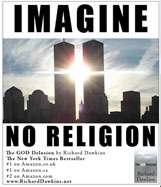All sins are pardonable, apparently, so long as one is sufficiently anti-Bush. It’s a religion that transcends religious divisions. Bush: A uniter, not a divider!
Month: October 2006
Thanks to the miracle…er, science and technology of podcasts, I just finished listening to yesterday’s especially great Penn Jillette Show, featuring extraordinary guest Richard Dawkins and several callers in discussions of atheism, morality, science and reason, in the context of Dawkins’ new book “The God Delusion.”
You can download the 10/25 podcast episode from pennradio.com or at pennfans.net.
I especially like the concept of these flyers that were designed as part of the book’s promotional campaign (I can’t find a good permalink to the source, but at the moment they’re here):
Man, if that doesn’t hit home.
Had I known that Dawkins was going to be a guest on the show, the question I’d have most liked to ask him would probably have been about the anti-rationalist “postmodernism” that seems to so dominate and hobble discourse in the humanities nowadays (at least here in the U.S.), and whether he sees it as yet another of the secular “vacuum-fillers” that tend to displace religiosity when it wanes, or perhaps sees it in some other way. Is it cause for worry, as some have asserted and as I tend to feel, or is it more of a passing intellectual fad whose ill effects are primarily limited to obscure, insular niches of academia and intellectualism?
Dawkins’ observation regarding this sort of ideological vacuum-filling phenomenon reminds me of a passage from Michael Crichton’s insightful 2003 talk “Environmentalism as Religion”:
Eden, the fall of man, the loss of grace, the coming doomsday—these are deeply held mythic structures. They are profoundly conservative beliefs. They may even be hard-wired in the brain, for all I know. I certainly don’t want to talk anybody out of them, as I don’t want to talk anybody out of a belief that Jesus Christ is the son of God who rose from the dead. But the reason I don’t want to talk anybody out of these beliefs is that I know that I can’t talk anybody out of them. These are not facts that can be argued. These are issues of faith.
It does seem to me, largely to my dismay, that there are underlying motivators toward what one might loosey call “religious” behavior in the human mind (in particular I’m thinking of the harmful fundamentalist aspects of that), that tend to allow for any number of other substitute ideologies to take the place of what we think of formally as “religion” when religion itself is not as prevalent. (Certainly there seem to be plenty of people who adhere to political ideologies with unbending fundamentalist fervor, which seems to me to fall into that category.)
“No Excuses for Terror” — a superb, must-watch BBC program by David Aaronovitch.
Thanks to my friend jcr for pointing out that I need to do a better job of keeping up with Little Green Footballs! And to David at Harry’s Place for pointing this out and getting it on LGF’s radar!









